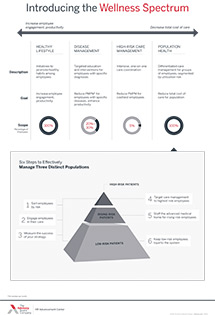Auto logout in seconds.
Continue LogoutEditor's note: This popular story from the Daily Briefing's archives was republished on Feb. 15, 2019.
Men and women who adhere to five lifestyle habits may live more than 10 years longer than those who don't, according to a study published in the journal Circulation.
Understand the wellness spectrum—and promote healthy habits at work
Study details
For the study, researchers analyzed data from the national Nurses' Health Survey and the Health Professionals Follow-Up Study, covering more than 122,000 people from 1980 to 2014, in order to measure the association between certain lifestyle factors and premature death.
The researchers focused on five lifestyle habits:
- Consuming no more than one 150ml glass of wine a day for women, or two for men; and
- Eating a healthy diet rich in fruit, vegetables, and whole grains, and low in red meat, saturated fats, and sugar;
- Engaging in at least 30 minutes of moderate exercise per day;
- Having a body mass index between 18.5 and 25; and
- Not smoking.
The researchers noted that the study had some limitations, such as relying on self-reported data on adherence to all five lifestyle factors and not accounting for certain health conditions that can increase the risk of premature death, such as diabetes or high blood pressure. Further, as the study was observational, it could not conclusively demonstrate that the lifestyle habits caused the increase in lifespan.
The 5 lifestyle factors associated with longevity
The researchers found that for participants who reported adopting all five lifestyle habits, life expectancy at age 50 was about 43 years for women and 37 years for men. Among those who followed none of the habits, life expectancy at age 50 was about 29 years for women and 25.5 years for men.
Put another way, the researchers found adopting all five healthy lifestyle habits was associated with 14 years of additional life expectancy among women and 12.2 additional years among men, when compared with individuals who did not adhere to any of the lifestyle habits.
Most of the life expectancy gains reflected lower incidences of cardiovascular disease and cancer. Individuals who followed all five habits had an 82% lower risk of death from cardiovascular disease and a 65% lower risk of death from cancer than participants who did not follow the habits.
Discussion
Frank Hu, a study author and chair of Harvard T.H. Chan School of Public Health's nutrition department, said that the study shows "the importance of following healthy lifestyle habits for improving longevity in the U.S. population"—though he added that "adherence to healthy lifestyle habits is very low."
Just "8% of adults in our country" are adopting these lifestyle changes, according to Meir Stampfer, a study coauthor and a Harvard professor. He said that we as a country "need to make it easier for ourselves to [make these changes] by promoting tobacco cessation, by providing better environments for physical activity and so on."
Douglas Vaughan, chair of the department of medicine at Northwestern University's Feinberg School of Medicine, who was not involved with the study, said that this study should encourage people to adopt a healthier lifestyle. While adopting all five habits was associated with the biggest life expectancy gains, Vaughan noted that the study data also show how each individual factor may affect premature death.
He said, "It looks like cigarette smoking has a more powerful effect than the other lifestyle changes or behaviors. Certainly, maintaining a reasonable body-mass index is a great way to protect oneself against the development of diabetes."
Jack Der-Sarkissian, a family medicine physician and assistant area medical director of Kaiser Permanente Los Angeles Medical Center, who was also not involved in the study, said, "Beyond cancer risk, smoking contributes to lung disease, heart disease and diabetes. The study shows that even minimal smoking—from one to 14 cigarettes a day—is associated with increased death due to cancer and heart disease" (Howard, CNN, 4/30; Thielking, "Morning Rounds," STAT News, 4/30; Sample, The Guardian, 4/30; DiSalvo, Forbes, 4/30).
Understand the wellness spectrum—and promote healthy habits at work
Programs aimed at promoting healthy habits among employees are likely to lead to improved employee engagement and productivity—but they're unlikely to reduce the total cost of care. To do that, you'll need to take a population health approach.
Don't miss out on the latest Advisory Board insights
Create your free account to access 1 resource, including the latest research and webinars.
Want access without creating an account?
You have 1 free members-only resource remaining this month.
1 free members-only resources remaining
1 free members-only resources remaining
You've reached your limit of free insights
Become a member to access all of Advisory Board's resources, events, and experts
Never miss out on the latest innovative health care content tailored to you.
Benefits include:
You've reached your limit of free insights
Become a member to access all of Advisory Board's resources, events, and experts
Never miss out on the latest innovative health care content tailored to you.
Benefits include:
This content is available through your Curated Research partnership with Advisory Board. Click on ‘view this resource’ to read the full piece
Email ask@advisory.com to learn more
Click on ‘Become a Member’ to learn about the benefits of a Full-Access partnership with Advisory Board
Never miss out on the latest innovative health care content tailored to you.
Benefits Include:
This is for members only. Learn more.
Click on ‘Become a Member’ to learn about the benefits of a Full-Access partnership with Advisory Board
Never miss out on the latest innovative health care content tailored to you.

